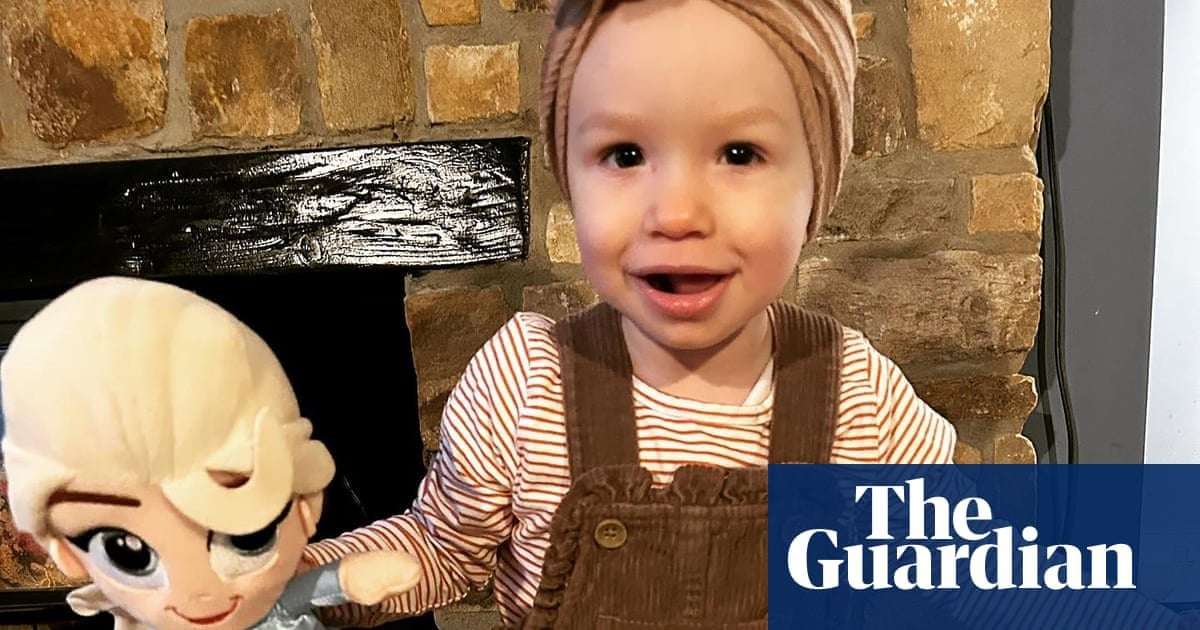A girl born with a rare and deadly genetic condition is expected to live a long and normal life after becoming the first person to be cured on the NHS with the help of a revolutionary gene therapy.
Teddi Shaw was diagnosed with metachromatic leukodystrophy (MLD), an inherited condition that causes catastrophic damage to the nervous system and organs. Those affected usually die young.
But the 19-month-old from Northumberland is now disease-free after being treated with the world’s most expensive drug, Libmeldy. NHS England reached an agreement with its maker, Orchard Therapeutics, to offer it to patients at a significant discount from its list price of £2.8m.
“Teddi is doing absolutely brilliant,” said her mother, Ally, 32. “She is walking, running, a chatterbox – absolutely no signs so far of MLD. She is an absolute character and has everyone around her laughing all the time.”
The chief executive of NHS England, Amanda Pritchard, said the breakthrough meant children such as Teddi could do the things that every child should be able to, “like going to school and playing with friends”. People born with the deadly condition could now lead normal, healthy lives, she said.
“This is a huge moment of hope for parents and their babies who are born with this devastating inherited disorder, that can now be treated with a single round of revolutionary treatment at a specialist centre on the NHS,” Pritchard said.
Libmeldy corrects the genetic cause of MLD by inserting functional copies of a faulty gene into the patient’s stem cells. The stem cells come from their own bone marrow or blood and are fed back into the body with the new genetic information.
Teddi had stem cells removed and the faulty genes replaced in several stages between June and October last year.
However, her family are still facing heartbreak because her three-year-old sister, Nala, who was also diagnosed with MLD last year, is too far advanced in her illness to benefit from the new treatment.
The drug, which is delivered as a one-off intravenous infusion, must be given before the irreversible damage caused by the disease progresses too far, according to guidance from the National Institute for Health and Care Excellence (Nice).
Teddi and her elder sister Nala, who is not eligible for treatment. Photograph: PA
“In April last year, our world was turned upside down when not one but both of our daughters were diagnosed with MLD,” said Ally Shaw. “Being told our first daughter, Nala, wasn’t eligible for any treatment, would continue to lose all functions and die extremely young was the most heartbreaking and hardest thing to come to terms with.
“However, amongst the pain was hope for our younger daughter, Teddi. We were told that a new gene therapy treatment had, luckily, recently been made available on the NHS. We are extremely privileged that Teddi is the first child to receive this on the NHS and grateful that she has the opportunity to lead a long and hopefully normal life. Without this treatment, we would be facing both our children being taken away.
skip past newsletter promotion Sign up to First Edition Free daily newsletter Archie Bland and Nimo Omer take you through the top stories and what they mean, free every weekday morning Privacy Notice: Newsletters may contain info about charities, online ads, and content funded by outside parties. For more information see our Newsletters may contain info about charities, online ads, and content funded by outside parties. For more information see our Privacy Policy . We use Google reCaptcha to protect our website and the Google Privacy Policy and Terms of Service apply. after newsletter promotion
“We can only hope that one day a treatment becomes available for all stages of MLD, and we feel strongly that it should be added to the newborn screening test to save more families from having to go through this heartache.”
About five children are born with MLD each year in England. Those whose MLD starts before 30 months deteriorate quickly and usually die between the ages of five and eight. Those whose condition begins between 30 months and six years have a life expectancy of 10 to 20 years more.
Libmeldy is available on the NHS at the Royal Manchester children’s hospital, one of just five European sites administering the treatment.
“It is wonderful to be involved in this breakthrough moment and deliver a gene therapy which will transform outcomes for patients with MLD,” said Prof Rob Wynn, director of the paediatric bone marrow transplant programme at the Royal Manchester.
“Being able to offer this first licensed treatment as part of NHS standard of care and, crucially, transform Teddi’s life has been an exciting experience for all of us involved here in Manchester – staff, researchers, patients and families.”

BitMadIsntIt on February 15th, 2023 at 15:39 UTC »
Uplifting headline… until I read the article. Gut wrenching on so many levels.
As a parent I have to ask: if I had one child with a debilitating and deadly condition, why have another child knowing they could also have it?
Edit: I read the article but missed the part where the parents were unaware of the first child’s condition. I can’t imagine how hard this is for them.
topcheesehead on February 15th, 2023 at 15:29 UTC »
I swear every post here has some seriously dark news attached. Her older sister isn't eligible for the treatment and will die young. They can only save one kid. That's traumatic af watching one kid thrive and one kid die
While it's uplifting to save one of your kids it's traumatic to lose one. This isn't uplifting. It's sad we didn't save them both. Her parents are saints. I hope the older sister has the best life she can
Pootins_Mini_PP on February 15th, 2023 at 14:51 UTC »
Wow this story has a grim twist!
Exciting news however. It’s an extraordinary achievement.